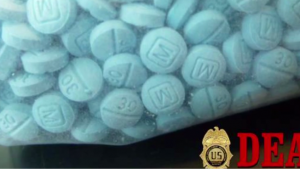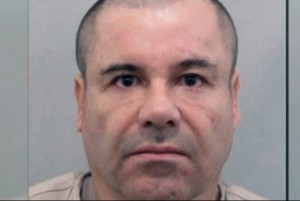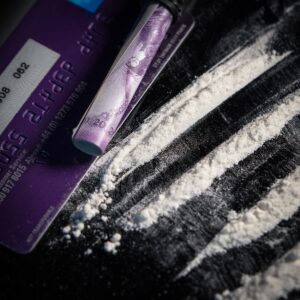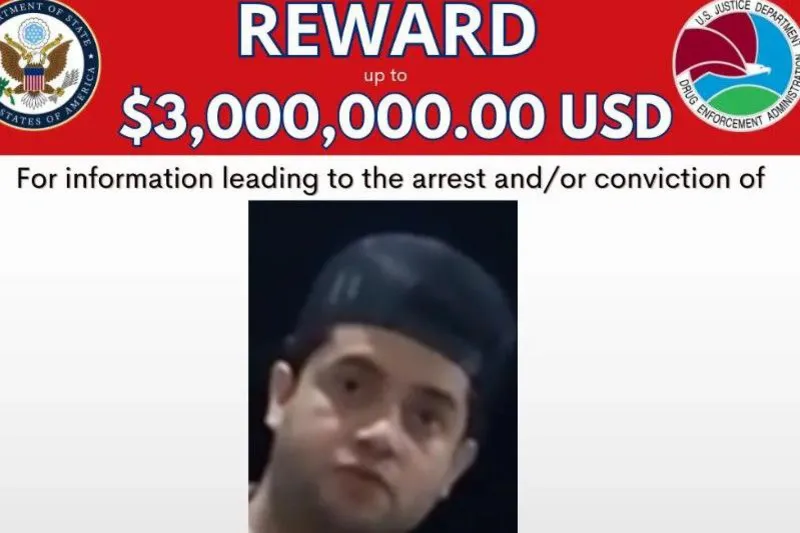WASHINGTON D.C.
 Alleged Sinaloa Cartel leader and lead sicario, or assassin, Néstor Isidro Pérez Salas, also known as El Nini, 32, of Mexico, was extradited Saturday from Mexico to the United States to face charges contained in two indictments, officials stated.
Alleged Sinaloa Cartel leader and lead sicario, or assassin, Néstor Isidro Pérez Salas, also known as El Nini, 32, of Mexico, was extradited Saturday from Mexico to the United States to face charges contained in two indictments, officials stated.
The Narcotic and Dangerous Drug Section (NDDS) of the Criminal Division filed the first indictment against Pérez Salas in the District of Columbia, charging him with importing cocaine and methamphetamine, violating the law regarding firearms, and conspiring to obstruct justice through murder.
He is presumed innocent unless proven guilty.
“Today, El Nini joins the growing list of cartel leaders and associates extradited to the United States and held accountable in an American courtroom,” said Attorney General Merrick B. Garland. “We allege El Nini was one of the Sinaloa Cartel’s lead sicarios, or assassins, and was responsible for the murder, torture, and kidnapping of rivals and witnesses who threatened the cartel’s criminal drug trafficking enterprise.”
Adding, “This includes killing a Drug Enforcement Administration (DEA) confidential source and killing others in retaliation for the confidential source’s cooperation. We also allege El Nini was a part of the Sinaloa Cartel’s production and sale of fentanyl, including in the United States. I am grateful to our Mexican government counterparts for their extraordinary efforts in apprehending and extraditing El Nini. The Justice Department will always be relentless in its pursuit of the cartels responsible for flooding our communities with fentanyl and other drugs.”

The second indictment, filed in the Southern District of New York (SDNY), charges Pérez Salas with leadership of a continuing criminal enterprise resulting in the deaths of numerous victims, including a confidential source for the DEA, fentanyl importation and trafficking, obstruction of justice by murdering an informant, kidnapping resulting in the deaths of eight people, including a minor boy, firearms, and money laundering offenses.
On Nov. 22, 2023, Mexican authorities detained Pérez Salas in Culiacan, Mexico.
According to court documents, the Sinaloa Cartel is one of the most powerful drug cartels in Mexico.
It is responsible for a substantial portion of the fentanyl that is manufactured and imported for distribution in the United States.

Fentanyl is a dangerous synthetic opioid that is more than 50 times more potent than heroin and is the leading cause of death for Americans ages 18 to 49.
In recent years, the cartel has been led, in part, by the sons of the cartel’s notorious former leader, Joaquin Archivaldo Guzman Loera, also known as El Chapo, and Ivan Archivaldo Guzman Salazar, Jesus Alfredo Guzman Salazar, and Ovidio Guzman Lopez—known collectively as the “Chapitos.”
Like their father, the Chapitos have used violence and rely on a sophisticated security apparatus to maintain control and to protect themselves and their operations as they traffic massive quantities of narcotics, including fentanyl, cocaine, and methamphetamine, to the United States.
Pérez Salas is allegedly one of the senior leaders of the Chapitos’ security apparatus.

Under Pérez Salas’ direction, armed enforcers for the Chapitos, known as sicarios, have allegedly used rampant violence to protect the Chapitos’ operations and to demolish unsupportive businesses, capture contested territory, intimidate civilians, and attack and murder law enforcement members who resist their efforts.
In part, under the direction of Pérez Salas, the sicarios allegedly regularly used military-grade firearms and explosives, including machine guns and rocket launchers, to kidnap, torture, and kill anyone who opposed the Chapitos.
 According to court documents, Pérez Salas is allegedly a leader and commander of the “Ninis,” a violent group charged with providing security for the Chapitos.
According to court documents, Pérez Salas is allegedly a leader and commander of the “Ninis,” a violent group charged with providing security for the Chapitos.
From at least 2012 until February 2021, Pérez Salas allegedly conspired to distribute and manufacture cocaine and methamphetamine for unlawful importation into the United States, using a firearm in furtherance of the alleged drug-trafficking offense, and killed, attempted to kill, threatened and caused bodily injury to another to intimidate a government witness and informant.
Pérez Salas has also allegedly committed brutal acts of violence to advance the Chapitos’ trafficking operations.
 For example, in or about 2017, Pérez Salas, along with two of the Chapitos, allegedly captured, tortured, interrogated, and killed two Mexican federal law enforcement officers, according to the indictment.
For example, in or about 2017, Pérez Salas, along with two of the Chapitos, allegedly captured, tortured, interrogated, and killed two Mexican federal law enforcement officers, according to the indictment.
In or about May 2017, Pérez Salas, with two of the Chapitos and others, allegedly captured three members of a rival drug cartel, Los Zetas, and tortured them before interrogating and killing them.
Also, in or about 2017, Pérez Salas and others allegedly conspired to kill and retaliate against a witness and informant. And in or about 2022, Pérez Salas and another sicario allegedly tested the potency of their fentanyl on individuals.
In addition, Pérez Salas has allegedly participated in the negotiation and sale of fentanyl.
 More specifically, in or about the summer of 2022, Pérez Salas and other associates allegedly sold fentanyl (later seized by the DEA) in Los Angeles.
More specifically, in or about the summer of 2022, Pérez Salas and other associates allegedly sold fentanyl (later seized by the DEA) in Los Angeles.
Finally, in or about October 2023, Pérez Salas and other sicarios acting at his direction allegedly kidnapped a confidential source and 10 other victims in Mexico—including a U.S. citizen—whom Pérez Salas believed worked for or were related to the confidential source.
Pérez Salas and his sicarios allegedly killed eight of the kidnapped victims, including the confidential source and a 13-year-old boy.
Pérez Salas allegedly kidnapped and killed these victims in retaliation for the confidential source’s provision of information to law enforcement in connection with the investigation of Pérez Salas and his associates in the Southern District of New York.
If convicted of the charges, Pérez Salas is facing up to life in prison.
The DEA’s Special Operations Division Bilateral Investigations Unit and the FBI Washington Field Office are investigating the case, with assistance from multiple DEA offices throughout Mexico, as well as the assistance of the U.S. Department of State Rewards for Justice Program and U.S. Marshals Service.
The Justice Department’s Office of International Affairs provided significant assistance in securing the arrest and extradition Pérez Salas.
The Justice Department also thanks Mexican authorities for their role in securing the arrest and extradition of Pérez Salas.
NDDS Trial Attorneys Kirk Handrich, Kate Naseef, Samantha Thompson, and Tara Arndt and SDNY Assistant U.S. Attorneys Nicholas S. Bradley, Sarah L. Kushner, Alexander N. Li, David J. Robles, and Kyle A. Wirshba are prosecuting the case.

